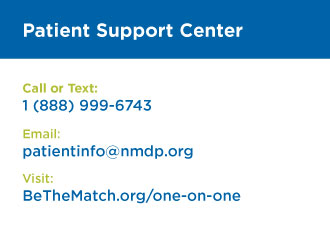It’s not unusual for people to feel thankful to be alive after overcoming a life-threatening illness. But being thankful after a blood or marrow transplant (BMT) can be difficult if you are also coping.
with negative physical, emotional and financial issues after a transplant.
Read on to get expert advice from a BMT Social Worker on how you and your loved ones can feel more thankful even in difficult times.
The following are excerpts from an interview with Olivia Eusden, MSW, LICSW, BMT Social Worker, Patient Support Center, Be The Match®.
Is thankfulness possible for people who have serious complications or challenges after BMT?
Olivia: Feeling grateful can seem nearly impossible when you have serious complications or challenges after BMT. Thankfulness is possible, it just may look different from before. For protective reasons, we often resist the pain caused by serious life challenges. But, if we surrender to the pain, it’s possible to feel hope that things will get better someday – and if not better, easier.
Recognizing even small feelings of hopefulness can allow you to move out of the victim space and into the “survivor” role. As a survivor, you might find that you take nothing for granted. You also might find that BMT gave you more perspective, brought you closer to others, afforded you more patience, or made you more empathetic. Perhaps you’re more resilient and open to new experiences than you once were. All of these changes you notice about yourself after transplant are reasons for gratitude.
What are some ways people can cope with ongoing challenges after BMT?
Olivia: Ongoing challenges after BMT can feel defeating. You might feel isolated in your grief and pain. It’s important to remember that you aren’t going through this alone.
If it feels like others in your support system “don’t get it,” try connecting to a community of people who share your experiences. Find a support group through your transplant center, or register for Be The Match Survivorship Chats.
Support groups are safe spaces to share your fears and frustrations without feeling judged or misunderstood. It can also be a place for you and other patients to share what you’ve learned, suggest creative solutions to common problems, and provide emotional support. Participants in a support group may understand what you’re experiencing in ways that other people might not.
What advice do you have for someone struggling to feel thankful after BMT?
Olivia: If you’re struggling to feel thankful after BMT, try to redefine “gratitude.” At another time in your life, showing gratitude might have felt important in situations such as receiving birthday presents, or when someone cooked you a meal.
Now, in more challenging times, appreciation and gratitude happens on an entirely different level. Gratitude might look like thankfulness for breath and vitality, or an appreciation for waking up in the morning and going to bed at night.
Some patients share that instead of wishing their experience with BMT away, they learned to take illness/recovery as an opportunity to slow down, regroup, and listen to what was going on for them personally. In that sense, illness became a tool for personal growth and discovery that may not have occurred otherwise.
What advice do you have for someone feeling pressured to express thankfulness after BMT?
Olivia: With Thanksgiving in view, the cultural nod to thankfulness is blatant. If you receive or feel pressure around the holidays to express thankfulness, recognize that you may not be in a place where gratitude feels possible right now.
Gratitude is personal and will vary from person to person based on past experiences, personality and circumstances. Give yourself permission, or ask for permission from a close family member or friend, to feel less-than-grateful at this time.
No matter where you are in your survivorship, if you’re feeling like your thankfulness is lackluster, it can be meaningful to spend just one moment each day listening to what your body is telling you without judgment. Notice something you weren’t aware of before, and explore the possibility of carving out a tiny space for gratitude just for having this daily ritual.
One day, you will be able to find a bit of gratitude and it may make all the difference.
___________________________________________________________
The Be The Match Patient Support Center provides support, information and resources for transplant patients, caregivers and families.
Contact us using the information below to register for a Survivorship Chat, talk to another BMT recipient or caregiver through the Peer Connect program, or get one-on-one telephone counseling support from a licensed clinical social worker. All services are free.
- Call: 1 (888) 999-6743
- Email: patientinfo@nmdp.org
- Learn: BeTheMatch.org/patient
- Request information: BeTheMatch.org/request

